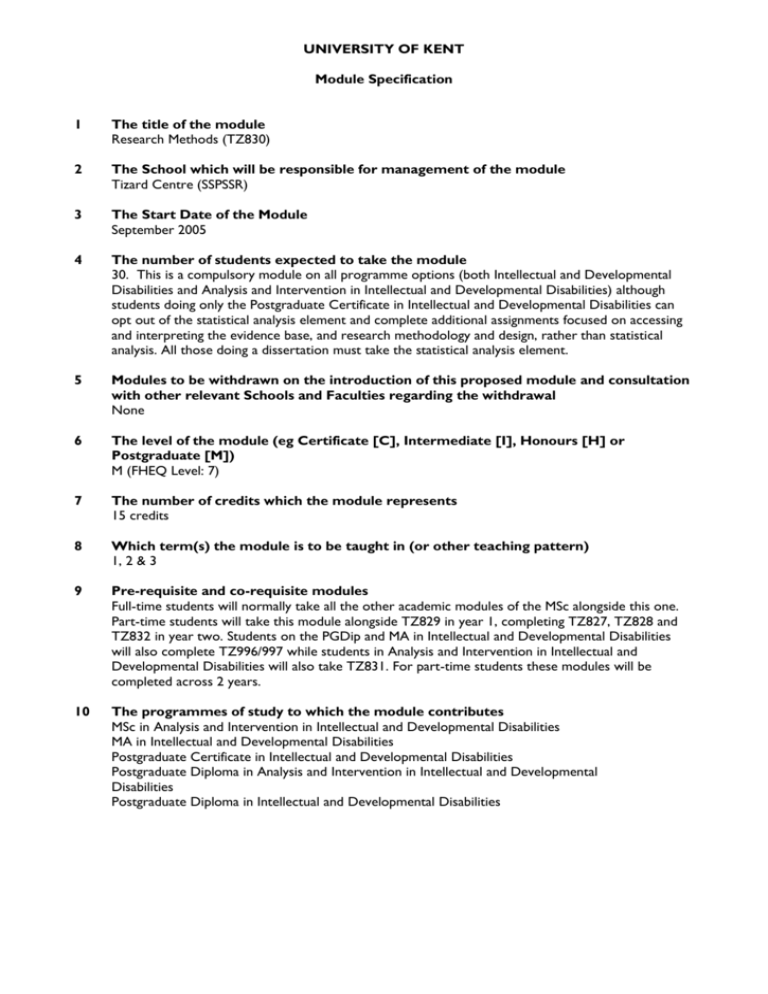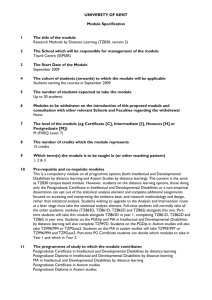Relationship to programme learning outcomes
advertisement

UNIVERSITY OF KENT Module Specification 1 The title of the module Research Methods (TZ830) 2 The School which will be responsible for management of the module Tizard Centre (SSPSSR) 3 The Start Date of the Module September 2005 4 The number of students expected to take the module 30. This is a compulsory module on all programme options (both Intellectual and Developmental Disabilities and Analysis and Intervention in Intellectual and Developmental Disabilities) although students doing only the Postgraduate Certificate in Intellectual and Developmental Disabilities can opt out of the statistical analysis element and complete additional assignments focused on accessing and interpreting the evidence base, and research methodology and design, rather than statistical analysis. All those doing a dissertation must take the statistical analysis element. 5 Modules to be withdrawn on the introduction of this proposed module and consultation with other relevant Schools and Faculties regarding the withdrawal None 6 The level of the module (eg Certificate [C], Intermediate [I], Honours [H] or Postgraduate [M]) M (FHEQ Level: 7) 7 The number of credits which the module represents 15 credits 8 Which term(s) the module is to be taught in (or other teaching pattern) 1, 2 & 3 9 Pre-requisite and co-requisite modules Full-time students will normally take all the other academic modules of the MSc alongside this one. Part-time students will take this module alongside TZ829 in year 1, completing TZ827, TZ828 and TZ832 in year two. Students on the PGDip and MA in Intellectual and Developmental Disabilities will also complete TZ996/997 while students in Analysis and Intervention in Intellectual and Developmental Disabilities will also take TZ831. For part-time students these modules will be completed across 2 years. 10 The programmes of study to which the module contributes MSc in Analysis and Intervention in Intellectual and Developmental Disabilities MA in Intellectual and Developmental Disabilities Postgraduate Certificate in Intellectual and Developmental Disabilities Postgraduate Diploma in Analysis and Intervention in Intellectual and Developmental Disabilities Postgraduate Diploma in Intellectual and Developmental Disabilities 11 The intended subject specific learning outcomes and, as appropriate, their relationship to programme learning outcomes Aim The aim of this module is to teach the students about research methodology and the knowledge needed to access and interpret the research literature. For those who take the statistical analysis module, the aim is also to teach experimental and non-experimental designs, including single case design and a variety of methods of data collection and analysis. The emphasis will be on methods of data collection and analysis which will be useful in clinical settings, so that advanced multivariate techniques will not be taught. Objectives On completion of this module students will: Be able to recognise advantages and disadvantages of different methods of data collection (direct observations, rating scales, questionnaires, interviews) Be able to access and interpret existing research Be able to conduct observational data collection, conduct interviews and select appropriate measures for collecting data. Be aware of different experimental designs and understand the advantages and disadvantages of different designs. Be able to conduct and produce simple descriptive summaries of observational and other types of quantitative data. Understand issues of reliability and validity and be able to calculate simple indices of these. In addition, those following the statistical analysis part of the module, will be able to: Demonstrate the ability to use simple parametric and non-parametric statistics and understand the embedded assumptions of these. Relationship to programme learning outcomes In order to “apply the theories and practice of applied psychology and social science within the intellectual and developmental disabilities field” (programme aim) students must be able to both conduct research projects and interpret the findings of other people’s work. This module provides them with the skills necessary to design and conduct research and to analyse and present the results both in the academic context of their dissertation and in the clinical and service context of their placements and their working environments. 12 The intended generic learning outcomes and, as appropriate, their relationship to programme learning outcomes Although most of the learning outcomes for this module are subject specific, they are also generic in that the skills students will learn can be used in any subject area where an appreciation of research methods is necessary and the ability to conduct research and analyse findings are necessary. The module prepares people to be able to conduct their dissertation (TZ996/997) and also to present, analyse and interpret findings from both assessment in services and with individual people (TZ831). 13 A synopsis of the curriculum Organisation and content This module will be taught by a combination of Web-based material, seminars, practical assignments and classroom-based problem-solving sessions, over 7 workshops, covering the following topics: Qualitative methodology and analysis (interviewing, focus groups) Methods of direct observation Questionnaires and rating scales Reliability and validity Experimental Design Descriptive Statistics In addition, for those following the statistical analysis part of the module: 14 Simple parametric analyses Non-parametric analyses Indicative Reading List Key texts will include: Kinnear, P. R. and Gray, C. D.(1997) SPSS for Windows made simple (release 12) Psychology Press Ltd: Hove Coolican, H. (1994) Research Methods and Statistics in Psychology. (4th ed.) Hodder & Stoughton. Further reading will be recommended through the lectures and core references will be provided electronically. 15 Learning and Teaching Methods, including the nature and number of contact hours and the total study hours which will be expected of students, and how these relate to achievement of the intended learning outcomes Hours of study: 150 Contact hours: 26 hours during 7 workshops in the form of seminars, practical sessions and problem-solving sessions. This will be reduced to 11 hours contact time for the Postgraduate Certificate in Intellectual and Developmental Disabilities. This module’s objectives are primarily about the acquisition of academically and professionally relevant knowledge and skills, much of which will be applied in the dissertation undertaken later in the course. The majority of material will be provided web-based with structured reading and preparation for seminars and practical sessions that will be held during workshops. 16 Assessment methods and how these relate to testing achievement of the intended learning outcomes This module’s objectives are primarily about the acquisition of academically and professionally relevant knowledge and skills. Accordingly, knowledge acquisition across the module is assessed through an unseen, web-based multiple-choice examination. which. Application of the knowledge base and skills will be assessed via two short assignments submitted at the students own pace during second term (but with final deadlines provided for each assignment) and one written unseen worked problem (3000 words). The worked problem will contribute 30%, the short assignments 20% and examination 50% of the final mark for this module. For students following the Certificate in Intellectual and Developmental Disabilities, the assignments will focus on content that is not related to statistical analysis. For the remaining students, one assignment will cover material from nonstatistical content and the other two assignments will be based on statistical analysis. 17 Implications for learning resources, including staff, library, IT and space This module is convened by Dr J Beadle-Brown. Much of the teaching on qualitative methods is provided by other Tizard staff and PhD students. Dr Julie Beadle-Brown will oversee the preparation of material for WebCT and the assessment for the module. In addition to general facilities in the University, MSc students have access to the Tizard Student Study Area (where there are currently 10 PCs providing the standard UKC managed student desktop). 18 A statement confirming that, as far as can be reasonably anticipated, the curriculum, learning and teaching methods and forms of assessment do not present any nonjustifiable disadvantage to students with disabilities As far as can be reasonably anticipated, the curriculum and methods of assessment do not present any disadvantages to students. In fact it is expected that students with dyslexia for example should potentially find the multiple choice web-based format easier to complete than exam formats which require essay writing. In terms of the face-to-face teaching methods students with disabilities should not be disadvantaged in any way. The use of web-based learning should allow students with disabilities to follow things at their own pace and to do more work at home, requiring less travelling. For those who find working from computer screen difficult we advise people to personalise their browser set up to set their colours and fonts to a format that makes it easier to read. We also offer to print web content on appropriately coloured paper if students require this type of practical help. Statement by the Director of Learning and Teaching: "I confirm I have been consulted on the above module proposal and have given advice on the correct procedures and required content of module proposals" ................................................................ Director of Learning and Teaching .............................................. Date Statement by the Head of School: "I confirm that the School has approved the introduction of the module and will be responsible for its resourcing" ................................................................. Head of School .............................................. Date









